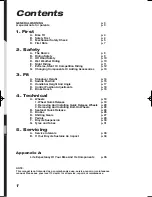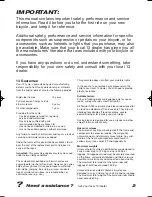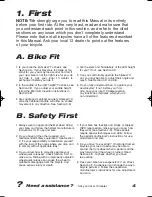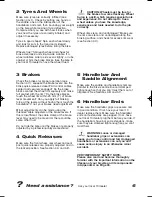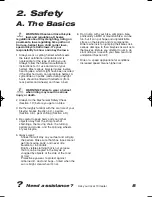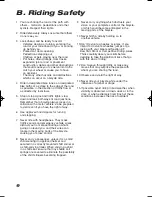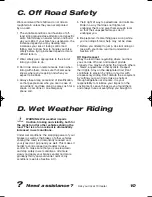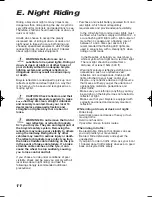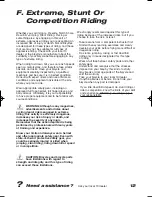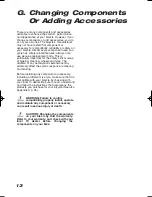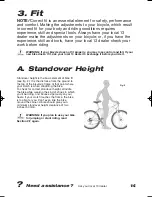
Like any sport, cycling involves risk of injury and
damage. By choosing to ride a bicycle, you
assume the responsibility for that risk, so you
need to know – and to practice – the rules of
safe and responsible riding and of proper use
and maintenance. Proper use and maintenance
of your bicycle reduces risk of injury.
This Manual contains many “Warnings” and
“Cautions” concerning the consequences of
failure to maintain or inspect your bicycle and of
failure to follow safe cycling practices.
• The combination of the safety alert
symbol and the word
WARNING
indicates a
potentially hazardous situation which, if not
avoided, could result in serious injury or death.
• The combination of the safety alert
symbol and the word
CAUTION
indicates a
potentially hazardous situation which, if not
avoided, may result in minor or moderate
injury, or is an alert against unsafe practices.
• The word
CAUTION
used without the safety
alert symbol indicates a situation which, if not
avoided, could result in serious damage to the
bicycle or the voiding of your warranty.
Many of the Warnings and Cautions say “you may
lose control and fall”. Because any fall can result
in serious injury or even death, we do not always
repeat the warning of possible injury or death.
Because it is impossible to anticipate every
situation or condition, which can occur while
riding, this Manual makes no representation about
the safe use of the bicycle under all conditions.
There are risks associated with the use of any
bicycle which cannot be predicted or avoided,
and which are the sole responsibility of the rider.
A special note for parents:
As a parent or guardian, you are responsible for the activities and safety of your child, and that
includes making sure that the bicycle is the right size and is properly fitted to the child; that it is in
good repair and safe operating condition; that you and your child have learned and understand the
safe operation of the bicycle; and that you and your child have learned, understand and obey not
only the applicable local motor vehicle, bicycle and traffic laws, but also the common sense rules
of safe and responsible bicycling. As a parent, you should read this manual, as well as review its
warnings and the bicycle’s functions and operating procedures with your child, before letting your
child ride the bicycle. Children must be under adult supervision, whilst learning to ride. Once they
can ride and are familiar with the bike, the appropriate level of supervision can only be the
judgement of the parent. In making this judgement; you should consider the riding skills of the
child, the risks associated with the riding conditions (e.g. traffic, wet, poor light, muddy, rough
surfaces, etc.) and their experience in riding in those conditions.
WARNING: Make sure that your child always wears an approved bicycle helmet
when riding; but also make sure that your child understands that a bicycle helmet is
for bicycling only, and must be removed when not riding. A helmet must not be worn while
playing, in play areas, on playground equipment, while climbing trees, or at any time while
not riding a bicycle. Failure to follow this warning could result in serious injury or death.
GENERAL WARNING:
3
13
owners manual GENERIC A5 aw
05/05/14
10:25 Page 5


